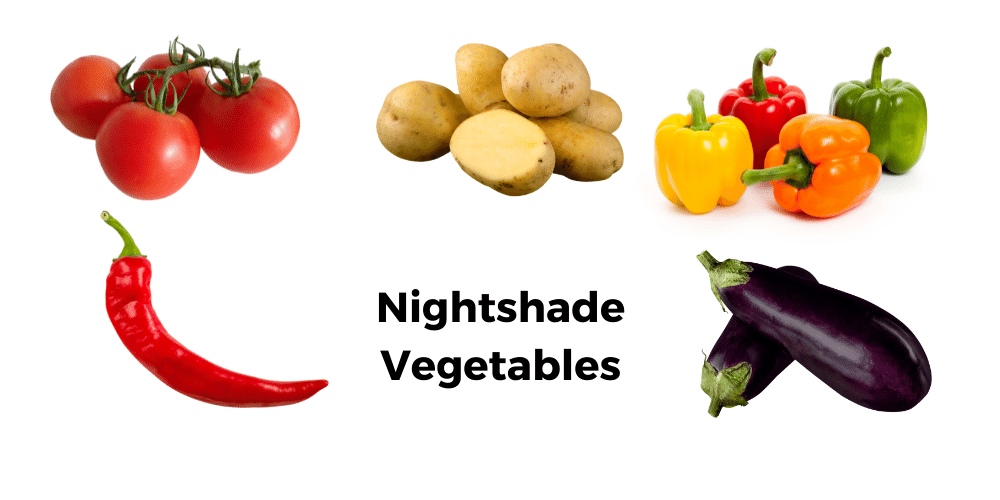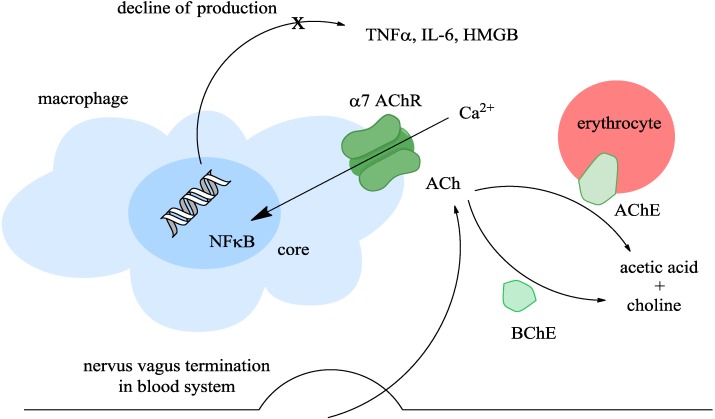Key takeaways:
~ Butyrylcholinesterase (BChE) is a cholinergic system enzyme that acts on the autonomic nervous system, which regulates processes such as blood pressure and breathing.
~ BChE is considered a bio-scavenger, protecting the body from certain toxicants or poisons.
~ Genetic variants in the BChE gene can cause problems with certain types of general anesthesia — and possibly with nightshade vegetables.
What is butyrylcholinesterase (BChE)?
Butyrylcholinesterase (BChE) is an enzyme with several unique functions. Many studies refer to it as a kind of backup for acetylcholine esterase, which is a neurotransmitter that causes cholinergic neurons to fire.
However, recent research points to several important roles of BChE in addition to being a backup for acetylcholine esterase.
Let me diverge for just a moment to explain cholinergic nerves…
Cholinergic neurons are essential in autonomic nervous system function as well as in the brain for circadian rhythm, time and spatial memory, and olfactory function.
Acetylcholinesterase (AChE) is the enzyme responsible for breaking down the acetylcholine in the synapses of nerves. Think of it as the ‘off switch’ for stopping a neuron from firing repeatedly. For example, in the synapse of a neuron, acetylcholine causes it to fire, contracting a muscle. AChE breaks down the acetylcholine, stopping the neuron from firing and letting the muscle relax. It all happens instantly and relies on having the right amount of acetylcholine and acetylcholine esterase (AChE). Too much inhibition of AChE results in death. Muscles need to relax – especially those controlling respiration – and excessive inhibition of AChE causes asphyxiation. AChE is essential for life, and there are very few genetic mutations that impact the AChE gene.[ref]
Getting back on topic here…
What does BChE do? BChE can break down acetylcholine, similarly to acetylcholinesterase. However, it doesn’t usually act within neurons like acetylcholinesterase (AChE). In other words, it isn’t the main way the body breaks down acetylcholine, at least under normal circumstances.[ref]
Interestingly, we have about 10 times more BChE in the body than AChE. So it must be important for something!
Not only can BChE bind to acetylcholine, but it can also bind to other substances that inhibit AChE. In this way, BChE is considered a bio-scavenger, protecting the body from certain toxicants or poisons.[ref] Inhibiting AChE at higher levels is deadly, so BChE plays an important role in protecting the function of AChE.
When is BChE important?
While the functionality of the BChE enzyme used to be in question, recent research shines a lot of light on this molecule. BChE is essential for:
- inactivating certain compounds in nightshades
- recovery from certain types of anesthesia
- inactivating immune response
- protecting against nerve agents, snake toxins, and other AChE inhibitors
- modulating the hunger hormone ghrelin
Let’s dig into all of these topics further…
1) Decreased BChE as a possible cause of Nightshade Sensitivity
The edible nightshade vegetables include potatoes, tomatoes, eggplant, and peppers.
 All of the nightshade family produce varying amounts of glycoalkaloids, which are AChE and BChE inhibitors. The plants produce these compounds to repel insects.[ref][ref][ref]
All of the nightshade family produce varying amounts of glycoalkaloids, which are AChE and BChE inhibitors. The plants produce these compounds to repel insects.[ref][ref][ref]
Getting more specific: One component of potatoes is a glycoalkaloid compound called α-solanine. The compound is found in the leaves, stems, and tuber we eat. When potatoes are exposed to light, they turn green due to increased α-solanine. (Green potatoes are toxic.)[ref]
The amount of glycoalkaloids in plants also depends on exposure to light, mechanical damage to the plant, and ripeness or spoiling of the plant. Glycoalkaloid levels do not become altered by cooking.[ref]
It is theorized that BChE variants interact with the alkaloid compounds in nightshades. For some people, having problems with nightshades depends on:[ref]
- the amount of nightshades eaten
- growing conditions (damage to the plant, ripeness)
- possibly a combination with pesticides (AChE inhibitors)
It has led some clinicians to theorize that people who carry genetic variants that significantly reduce BChE function may have food sensitivities to nightshade vegetables.
What are the symptoms of nightshade intolerance?
Nightshade vegetables have associations with increased joint pain, especially in people with rheumatoid arthritis.[article]
Potatoes, especially fried potatoes, are thought to increase the risk of inflammatory bowel diseases due to their glycoalkaloid content.[ref]
Additionally, people with psoriasis may be more prone to nightshade sensitivity. A survey from the National Psoriasis Foundation found eliminating nightshades was beneficial for about half of psoriasis patients who had tried it.[ref]
In addition to the nightshade vegetables we eat, other plants that people could consume are also in this family.
- Popular supplements such as ashwagandha and goji berries also fall into the nightshade category.
- Belladonna is also known as ‘deadly nightshade’ due to its effect on AChE.
- Cocaine is another plant product that BChE breaks down. In fact, researchers are working on ways to utilize BChE to reverse cocaine overdoses.[ref]
2) BChE and recovery from anesthesia (succinylcholine)
More important but less common is the problem with anesthesia in people with more severe BChE deficiency.
BChE levels become important when exposed to certain types of anesthesia. The BChE enzyme controls the breakdown rate of succinylcholine, which is a muscle relaxant used during surgery. People with genetic variants that significantly decrease the amount of BChE (listed below in the genetics section) can have problems coming out of anesthesia and returning to breathing on their own. It is important to talk with your doctor before surgery if you have certain BChE variants so that anesthesia can be adjusted.
I’ll go into more detail on this in the genetic variants section below. Coming out of anesthesia and being able to breathe… it comes up at the top of my “important’ list.
3) Immune function, Macrophages, and the Vagus nerve
BChE also plays a role in the cholinergic anti-inflammatory system.
The cholinergic anti-inflammatory system is a one-way system by which the brain can signal and control the immune response through the vagus nerve.
Macrophages, a type of white blood cell, have acetylcholine receptors on their surface, and acetylcholine can then trigger a part of the immune response. AChE and BChE can turn off the immune activation when it is no longer needed.[ref] BChE can be especially important in the immune response – more so than AChE – since it circulates in the bloodstream.
Below: AChE and BChE inactivating acetylcholine, released from the vagus nerve and acted on a macrophage.[Ref-CC license]

4) BChE as a bio-scavenger:
Inhibiting AChE is generally bad and often deadly. Thus, researchers think this is one reason why we have a built-in system in which BChE can break down toxins to protect AChE.
AChE inhibitors include:
- Some natural toxins, such as snake venom
- Sarin and VX nerve gas
- Pesticides such as organophosphates and carbamates
BChE may act as a bio-scavenger in the plasma, breaking down these molecules before they can interfere with nerve transmission and AChE.
Nerve Gas Tests: In the past (1940s-’60s), tests on military volunteers determined the effects of low levels of the nerve agents that targeted AChE. These human tests demonstrated the vast differences between individuals’ responses to nerve gas, and the differences showed ties to genetic variants in the BChE gene. Modern animal and cell studies have confirmed this since we thankfully no longer test nerve gas on people![ref]
Interestingly, researchers are working on creating bacteria that produce the human BChE enzyme as a bioremediation method for combating environmental pesticides.[ref]
Pesticides: Organophosphates, Carbamates, and BChE
Organophosphates are a class of insecticides commonly used in agriculture, veterinarian use, home pest control, and mosquito control. They are the most widely used type of pesticide.
First developed in the 1930s in Germany as a new insecticide, organophosphates were also used in biological warfare in WWII.[ref]
Organophosphate pesticides include:[ref][ref][ref][ref]
- malathion (lice, mosquitoes)
- chlorpyrifos (worms, termites)
- parathion (banned in a lot of countries),
- diazinon (agricultural insecticide)
- fenitrothion (chewing and sucking insects)
- dichlorvos,
- ethion
Carbamates are another prevalent insecticide. Carbamyl (Sevin), a carbamate, is extensively used as an insecticide in home and agriculture.
Organophosphates and carbamates work to kill insects by inhibiting AChE. Organophosphates are irreversible AChE inhibitors, meaning that large exposure to organophosphates can’t be counteracted. Carbamates, on the other hand, are a little less toxic and reversible inhibitors of AChE.
BChE possibly acts as a bio-scavenger, protecting AChE from being impacted by organophosphates and other substances.[ref] People with BChE genetic variants may be more prone to detrimental effects from exposure to organophosphates.[ref]
BChE, organophosphates, and Parkinson’s risk:
Pesticide exposure has been linked to Parkinson’s disease for a long time. Chlorpyrifos and other organophosphates increase the risk of Parkinson’s disease, depending on the amount of exposure and the genetic variants the person carries.[ref][ref][ref]
More importantly, one of the genetic variants that increase the risk of Parkinson’s due to pesticide exposure is in the BChE gene. (below)
5) BChE and Ghrelin:
Recently, researchers have found that there may be another physiological role for BChE in humans. It has been shown that BChE also inactivates ghrelin, the ‘hunger hormone’. The cells of the stomach release ghrelin, thus causing the stimulation of muscle cells in the stomach that gives us ‘hunger pains’. Ghrelin also activates certain regions in the brain, causing us to seek out food and helps drive food cravings. Finally, ghrelin is also active in fat storage.[ref][ref]
Both humans and animals with a lack of BChE have higher than normal ghrelin levels. When researchers altered the BChE gene in mice to overexpress BChE, the mice had significantly lower ghrelin levels. Researchers have also found that increasing BChE levels keep formerly obese mice from rebounding and gaining back weight.[ref]
Related article: Ghrelin Genes
When is cholinesterase inhibition a good thing?
While too much of a cholinesterase inhibitor is obviously bad (death is never a good side-effect), a minor inhibition of cholinesterases can be beneficial in some circumstances.
Extending the time a neuron has exposure to acetylcholine can be beneficial in some cases of Alzheimer’s disease. It also can increase REM sleep, which could be beneficial at times in relation to learning and memory. Also, cholinesterase inhibitors are sometimes prescribed for schizophrenia.[ref][ref]
In fact, a recent study in mice looked at a couple of traditional African medicines made from the leaves of plants in the nightshade family. The study found that the leaves of the African eggplant and Black nightshade may help with cognitive impairment in mice.[ref]
The dose makes the poison is a well-known saying, and the right amount of cholinesterase inhibition can be beneficial in specific medical circumstances, including myasthenia gravis and certain types of glaucoma. Carrying a genetic variant that decreases BChE could be beneficial in some ways – and thus explains why a BChE variant that mildly decreases enzyme function is common in the human population.
BChE and Sudden Infant Death Syndrome (SIDS):
A recent study examined blood samples of infants who had died of SIDS (sudden infant death syndrome) and found that they had low levels of BChE. The researcher thought that the low BChE could be responsible for SIDS.[ref]
While an interesting finding, the research study raised questions since they could also not test for acetylcholine esterase levels. Hopefully, this study will be followed up with more research to replicate the findings on this important topic.
BCHE Genotype Report:
The variants below reduce the function of the BChE enzyme. Researchers think that the effect is additive, so if you have two variants (e.g., the A variant and the K variant), the effect is stronger than if you have one variant.[ref]
Lifehacks for BChE variants:
Below are summaries of research studies on the possible consequences of the BChE mutations. Of course, talk with your doctor if you have any questions about your health.
Nerve gas and Veterans: Everyone should avoid exposure to nerve gas, but anyone with a BChE variant may be even more at risk… If you’ve been exposed to organophosphates or nerve agents in the first Gulf War, you may be interested in the genetic connections between the BChE variants and Gulf War Syndrome.
Avoiding Organophosphates:
People with the BChE K-variant are at an increased relative risk of Parkinson’s with exposure to organophosphates. This is particularly important for people in agricultural industries.
To reduce your exposure to organophosphates, try eating organic when possible, watch out for exposure to pesticides (e.g., agricultural spraying), and avoid using pesticides in your home.
- If you are interested in knowing which pesticides are commonly detected on foods in the US by the FDA, check out the What’s On My Food website.
- The Environmental Working Group puts out a list each year called the “Dirty Dozen” of the fruits and vegetables tested that have the most pesticide residue.
Anesthesia complications: Important
Related Articles and Topics:
Should you eat organic? Detoxifying Organophosphates
Is buying organic worth the extra cost? There isn’t a one-size-fits-all answer to that question. Pesticides sprayed on conventionally grown foods affect people differently. Some people carry genetic variants that decrease their ability to detoxify specific pesticides, others may be more resilient.
Alzheimer’s and Light at Night: Taking action to prevent this disease
With the advent of consumer genetic testing from 23andMe, AncestryDNA, etc., it is now easy to know if you are at a higher risk of getting Alzheimer’s Disease (AD). Those with APOE ε3 are at normal risk for Alzheimer’s, and those who carry an APOE ε4 allele (or two) are at an increased risk.

